EverlyWell Review + Coupon Code
Could your symptoms indicate a food sensitivity? Here is everything you wanted to now about food sensivities, as well as how to use the EveryWell Food Sensitivity Test to identify them! (and get 15% off!)
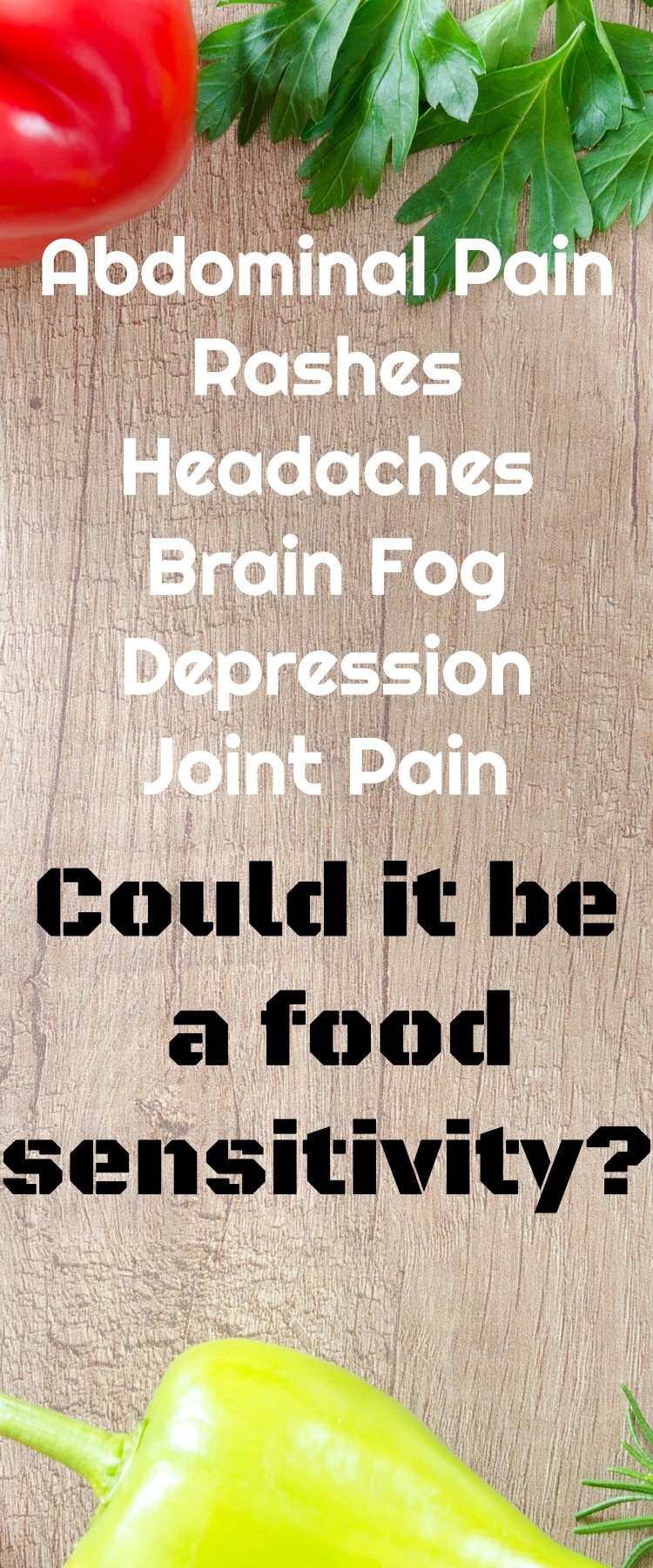
EverlyWell Food Sensitivity Test Review
“Do people actually eat food and not feel sick afterward?”
That’s the question I asked Forrest a few weeks ago. It’s been so long since I’ve actually been able to eat a meal without feeling sick…that I don’t even know how that would feel.
Although I’ve gotten allergy testing done and been cleared of any major allergies, I definitely have sensitivities to certain foods – and it only seems to be getting worse. Not only do I have a considerable amount of abdominal pain most of the time, but I have other symptoms that are typical of food sensitivities (migraines, foggy brain, skin issues, fatigue, etc.), so I feel pretty desperate to find some answers.
Sometimes I will think it’s something, but then I will eat another derivative of that food and feel fine, so it’s been hard for me to know what exactly I should eliminate from my diet.
Last year, I heard about EverlyWell, which is a company that offers a variety of different health-related tests that you can do from the comfort of your own home.
The one that stood out to me the most was the food sensitivity testing. In the past, I had looked into food sensitivity testing, but the cost was through the roof, so I decided not to.
While the EverlyWell food sensitivity test is still a bit pricey at $200, it was less than the initial testing I had seen. But still, after a year of contemplating it, I still hadn’t taken the plunge.
So when I saw they were having a great Black Friday sale in November, I was really tempted. Forrest told me he thought I should because if it could help give some insight into helping me feel better, then, well, it would be money well spent.
With his encouragement, I took advantage of their deal, and just a few days later, the kit came in the mail.
For the test, I had to prick my finger to draw my blood, and it just freaked me out, so it sat on our dining room table for a few weeks until I built up the courage to do it.
Then I sent it off in the mail, and within just a few days, I got an email saying my results were ready.
I’ll share those at the end of this review, but I will tell you – I was surprised with what I learned, but as I thought about it, it made sense.
EverlyWell was recently on SharkTank, so I’m sure there has been some increased interest in this test, so I thought I would share my unsponsored, unbiased review of EverlyWell (I bought this test with money from my own pocket!) so you can decide if it’s right for you.
First, I want to go over some of the logistics of food issues, how the test works, etc. If you are just interested in the results and discount code, feel free to scroll to the bottom 🙂
Click here to buy your food sensitivity test – get 15% off with code Clarks15.
[the_ad id=’68689′]
Food Allergy vs Food Sensitivity vs Food Intolerance
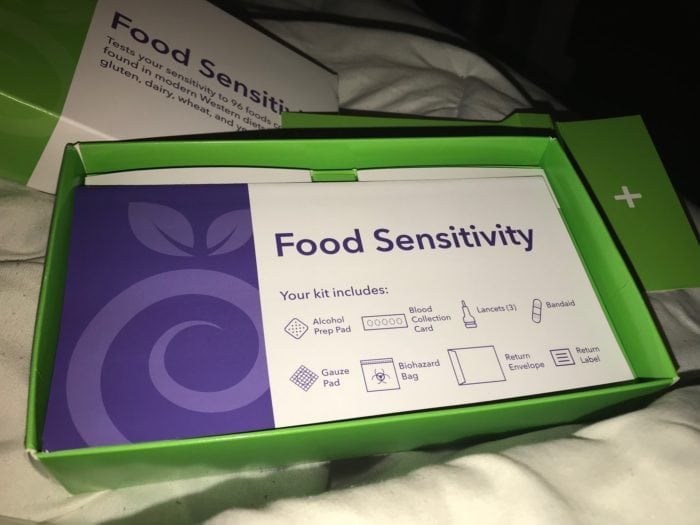
There are a lot of different ways your body can react to food, and there are different names for them.
This can get confusing, and I know that a lot of people don’t take them seriously – especially if you don’t have a food allergy, but more a sensitivity or intolerance.
There has been a lot more talk and research about food sensitivities. Most of this supports the idea that you can have a reaction to certain foods or additives, and it can cause a lot of distress.
A food allergy is an immunological response to eating a certain food, your body seeing it as harmful, and, as a result, your immune system overreacts in an attempt to fight it off. These typically happen immediately after exposure, and they can be life threatening. Food allergies are typically verified with blood tests and/or a skin prick test. Some food allergies can be outgrown (especially in children), but many people suffer from them for a lifetime. These must be taken very seriously.
Food sensitivity or food reactivity is a delayed immune response by the IgG antibody. The thing that is tricky with food sensitivities is that
A food reactivity is different than an immediately life-threatening food allergy. Food reactivity is a delayed immune response by the Immunoglobulin G (IgG) antibody, the largest circulating antibody in our immune system. This is a great article about IgG testing.
There is more and more evidence popping up that shows that eliminating IgG reactive foods can improve symptoms like migraines, digestive problems, fatigue, etc.
I’ve been reading more about the IgG test, and it’s really interesting the studies that have been done. I feel hopeful that by following an elimination diet with the foods I tested positive for, I might be able to find some relief from the increasing pain and symptoms I have.
Sensitivity and intolerance are often used interchangeably, however, from what I’ve read, they are difference.
A food intolerance typically means that you are missing an enzyme that can process that food – for instance, if you are lactose intolerant, you don’t have the enzyme that will process the food, which makes it hard for your body to digest. Have a food intolerance does not mean your body has an immunological response to it. There’s not really a good way to test for a food intolerance.
Food Sensitivity Symptoms
There are a host of symptoms that may indicate you have a food sensitivity. Here are some of the most common:
- Migraines/headaches
- Moodiness and/or depression
- Rashes
- Skin problems
- Abdominal pain or distress
- Digestive problems (IBS, acid reflux, etc.)
Is Food Sensitivity Testing Legit?
Food allergy testing has been around for quite some time, and it’s typically well-regarded by the medical community.
Food sensitivity testing is newer, and there are different thoughts and opinions on it. I think it’s gaining more legitimacy though, especially as food sensitivities become more in the spotlight.
From what I’ve read, the IgG sensitivity test is actually called a IgG allergy testing, so it is a form of allergy testing. It goes through an actual lab, and the results need to be certified by a board certified doctor.
Some people think that if you eat a lot of a certain kind of food, showing up as highly reactive actually means that your body can tolerate it well..but from what I’ve read from people who have done it, this isn’t really true. Based on my results, I don’t think this is true – I don’t eat much of the foods I had a higher reaction to.
Something to keep in mind is that if you have already eliminated something from your diet (such as gluten), you likely won’t test positive for those foods because they aren’t in your system.
One thing that people might find odd is if they test positive for something they never eat. For instance, I had a mild reaction to cottage cheese – which I NEVER eat (I can’t even hardly look at it). EverlyWell says that when this happens, it means there was likely some cross reactivity.
How Does EverlyWell Work?
After you place your order for a sensitivity test, it will arrive in a small box a few days later.
It has all the instructions in the box, but basically you have to put your ring or pinky finger under warm water for about 30 seconds, and then you will prick your finger using the included lancets. You have to fill up at least three circles on the sample card with your blood – though if you can get all five, that is preferred.
Not gonna lie – it kind of hurt, and I didn’t love having to squeeze the blood out of my finger! But it was over pretty quickly.
After you take your sample, you let it sit out for about 30 minutes, then you place it in a biohazard bag, put it in a prepaid envelope from EverlyWell, and then you ship it off to their lab.
As soon as it arrives, the results will be ready within five business days – I had mine after about two. It was super fast!
EverlyWell works with the leading speciality labs in the United States, and the rsults are also reviewed by a board-certified physician before you ever see them.
My EverlyWell Test Results
I was nervous as I waited for my results. A part of me was worried it would come back saying I was sensitive to all the good food in life (which, honestly, it feels like at times!)
So imagine my surprise when I saw this as I opened my results:
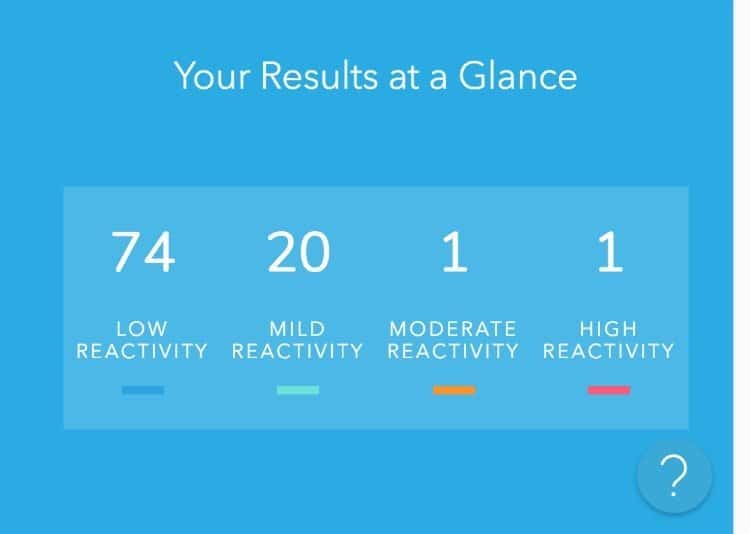
Just one high reactivity food, one moderate, and a bunch of mild.
Imagine my surprise as well when I saw that peanut ranked very highly as the one high reactivity food. I mean, I’ve never really liked peanuts that much so I don’t eat them a lot, but it surprised me! Peanuts wasn’t even on my radar.
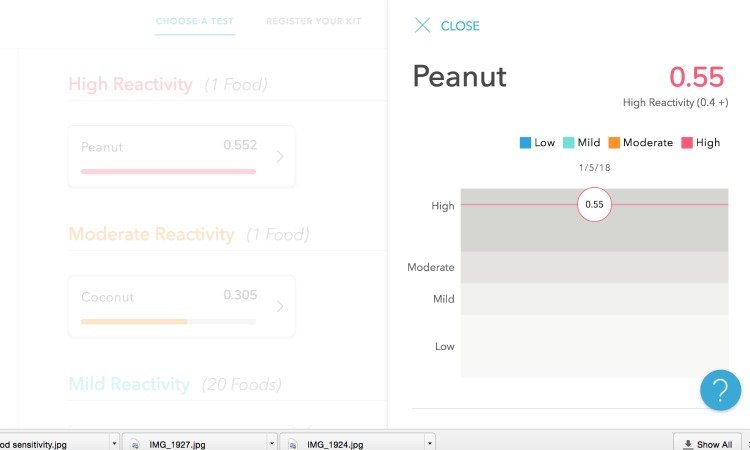
Coconut was the moderate, which I’ve actually suspected. We used to use a lot of coconut milk when Jack couldn’t have dairy, and it made me so sick!
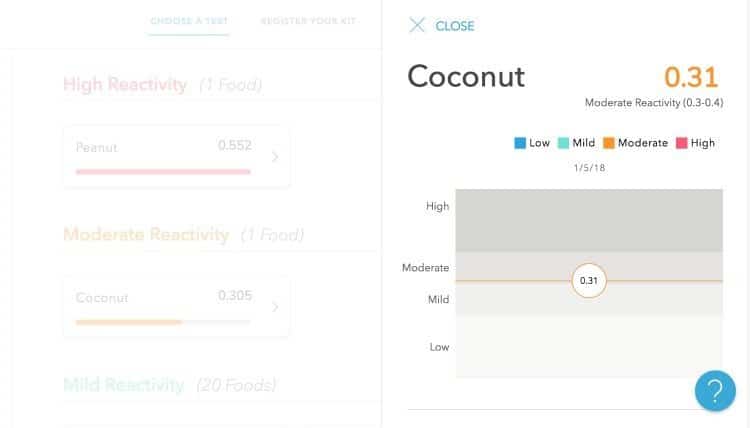
I actually have been really sick this week, and it started about 2-3 days after I had a meal that had coconut milk AND peanuts in it. Since food sensitivities can be delayed, it does make me wonder if it played a factor in that.
Almost all of my mild reactivity foods are actually things that at times I’ve wondered if I was sensitive to – but then at other times, I was okay. While I’m no expert, I think that these foods may cause a reaction in me when eaten in large quantities (for instance – I get sick whenever I eat pizza, which contain large amounts of gluten and mozzarella. Or when I went to a restaurant in Salt Lake City last year where we had bread as an appetizer, pizza, and bread pudding, and I’d never felt so sick in my life!)
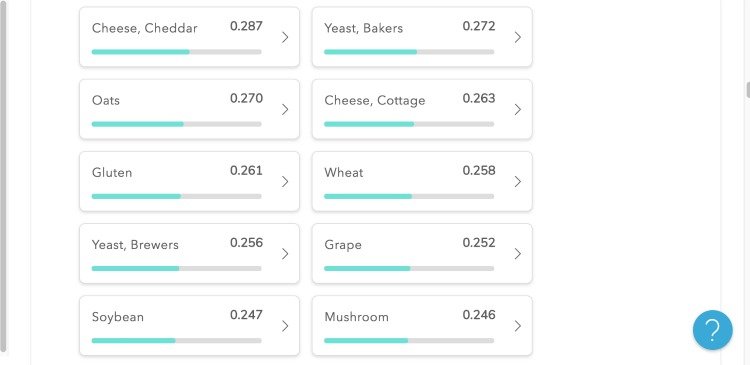
I also recently found out through DNA testing that I’m more likely than the average person to develop Celiac disease. I was tested about five years ago, which came back negative, but it does make me wonder if my mild reaction to gluten and flour in this test has something to do with that predisposition.
I asked my friend, Jenny, from Good For You Gluten Free for her thoughts on my results. She said that the fact that I only had a couple of higher reactivity foods most likely means that I have good gut health, and I’m more likely to actually be sensitive to the foods it says, which I thought was super interesting.
Apparently, if you don’t have very good gut healthy, you may have a larger list of highly reactive foods, which may or may not actually be causing an issue, but they can help guide you as you do an elimination diet.
What to do with your EverlyWell Test Results?
So, now that I’ve gotten my results – what am I going to do next?
EverlyWell recommends two courses of action – either eliminate all of the high or moderate reactivity foods from your diet for 30 days and then slowly add them back in and see how you feel.
If you don’t see a big difference, they recommend adding some of your higher class 1 foods to the elimination diet and go down the list (for instance, I actually have several foods that were close to class 2, so I am considering removing those for awhile, too). They say you can also eliminate all the foods you had any reaction to (including mild) for 30 days, which might be good if you just feel sick all the time (which I do…so…)
Personally, I plan to eliminate coconut and peanut for a few weeks and go from there. I do think that large quantities of my mild foods do causes me problems, but I want to see how I feel with those first two foods and go from there (because I really don’t want to eliminate some of those mild foods!)
Of course, make sure you discuss your results with your doctor. You can print off a physician version of your test results for you to discuss with them.
I have spent a lot of time reading some reviews people have done of EverlyWell food sensitivity testing, and overall, many people said that this test helped them figure out why they felt so sick. I’m really excited to see what happens.
Most of all, take your test results as a guide. If you have a lot of highly reactive foods, you likely aren’t actually reactive to all of them. It is meant to help you figure out your trigger foods with a smaller list of foods – rather than trying to guess on your own (which is so, so hard!)
EverlyWell Discount Code
Although I paid for this test with my own money for personal benefit, I did signup to be an affiliate with their company when I decided to write this post. I reached out to them about offering an exclusive discount code. They generously offered the following code for 15% off!
Click here to buy your food sensitivity test – get 15% off with code Clarks15.
Or if there is a better deal, it will show up here:
[the_ad id=’68689′]
EverlyWell has tons of other tests to help you figure out your health! Definitely check them all out. Here are a few that stood out to me:
- Metabolism Test
- Breast milk DHA
- Women’s Health and Fertility
- Heavy Metals Test
- Sleep and Rest
- Ovarian Reserve






